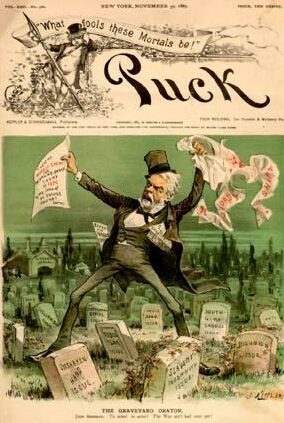Waving the bloody shirt facts for kids
"Waving the bloody shirt" is a phrase used to describe politicians who tried to win elections by bringing up strong emotions about the American Civil War. They would talk about the soldiers who died to make people feel angry or sad, hoping to get votes. This phrase was mostly used against Republicans. People accused them of using the Civil War's memory for their own political gain. However, Democrats also used similar tactics, especially when campaigning in the South.
Contents
What Does "Waving the Bloody Shirt" Mean?
The phrase "waving the bloody shirt" describes a way politicians tried to get votes. They would remind people of the American Civil War and the soldiers who died. This was done to stir up strong feelings like anger or sadness. The goal was to make voters support them or dislike their opponents.
How the Phrase Started
The term became popular because of a story about Benjamin Butler. He was a Representative from Massachusetts and a former Union general. In April 1871, he gave a speech in the U.S. House of Representatives. People later claimed he held up a shirt stained with blood during this speech. The story said the shirt belonged to a "carpetbagger" who had been hurt by the Ku Klux Klan during the Reconstruction Era.
The Real Story Behind the Phrase
While Benjamin Butler did speak out against the Ku Klux Klan, he never actually waved a bloody shirt. The story about the shirt was made up. People in the South, especially white Southerners, used this made-up story to make fun of Butler. They used the phrase "waved the bloody shirt" to try and make people ignore the bad things the Klan was doing. This included violence against formerly enslaved people and Republicans.
The Red Shirts and Their Name
The Red Shirts were a group from the 1800s. They were a paramilitary organization that believed in white supremacy. They actually took their name from the idea of "waving the bloody shirt."
Modern Use of the Phrase
Today, the phrase "bloody shirt" is still used. It's often shortened to just "bloody shirt." It now means any effort to create strong disagreements or anger between different political groups. It's used when someone tries to stir up old conflicts to gain an advantage.
 | James B. Knighten |
 | Azellia White |
 | Willa Brown |


